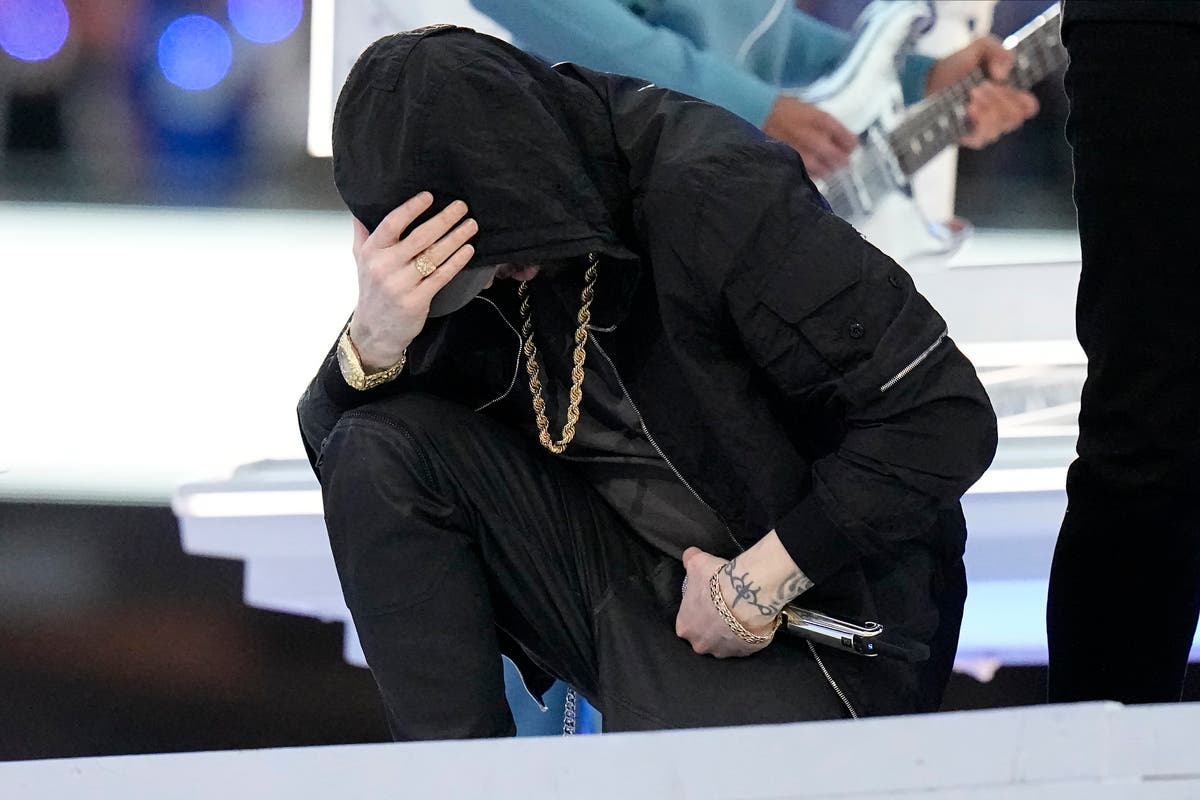
On Sunday, a spokesman for the NFL confirmed what some of us suspected: they knew Eminem was planning to take the knee during the Super Bowl Halftime Show.
Hours before the Dr Dre-led halftime show started, which also featured Snoop Dogg, Mary J. Blige, Kendrick Lamar, and 50 Cent, a report surfaced alleging that the NFL had tried to stop Eminem from making the nod to Colin Kaepernick, the former San Francisco 49ers quarterback who took a knee during the playing of the national anthem during the 2016 season to protest police brutality and racial inequity. Kaepernick’s political protest drew the ire of many, including then-President Trump, and after Kaepernick opted out of his 49ers contract in 2017, he was unable to find another quarterbacking job. He later accused the NFL of colluding to blacklist him (he settled a lawsuit with the league in 2019).
In theory, Eminem making the gesture to Kaepernick — who has still yet to re-enter the league — would be controversial. But folks tend to forget that some “controversies” are occasionally carefully choreographed, and thus not as rebellious as they seem.
To wit, an NFL representative shut down the claim of tampering with Eminem’s attempt as “erroneous.”
“We watched every rehearsal this week and these elements were included,” a statement sent to Insider said. “As you know, no player, coach or personnel member has been sanctioned for taking a knee so there would be no reason for us to tell a performer he or she could not for whatever reason.”
Besides Colin Kaepernick, anyway.
Separately, a league spokesman, Brian McCarthy, confirmed to the New York Times that they knew Eminem was going to kneel because officials “watched it during rehearsals this week.”
This doesn’t take anything away from Eminem’s efforts to bring awareness to Kaepernick or the subject behind the protest that led to him being (unjustly) cast aside from the league. Black people are still being killed by the police. Anyone doing their part to bring attention to that is doing a good thing.
Still, it is difficult for me to be too cheery about what ultimately amounts to a gesture sanctioned by a league that, like other American institutions, is failing to bring about the systemic change many are demanding.
In 2019, the NFL partnered with the Jay Z-founded Roc Nation to both reinvigorate the Super Bowl halftime show and, as the league put it in a statement at the time, “to amplify the league’s social justice efforts.”
Jay-Z drew some pushback for saying some of us were “stuck on Colin not having a job” at the time. “I support any protest that’s effective,” he said. “I’m into action, I’m into real work—I’m not into how it looks from the outside. If protesting on the field is the most effective way, then protest on the field. But if you have a vehicle that can inspire change and speak to the masses at the same time, it’s hard to steal the narrative away.”
As far as the work the NFL promised to do with Roc Nation, the halftime shows are the only changes worth talking about.
It was nice to see hip hop finally get the sort of recognition it deserves at this year’s Super Bowl. I have no problem with Maroon 5, but it felt sinful back in 2019 for the NFL to be in Atlanta, a Black music mecca, and only feature Big Boi from Outkast. It’s about time hip hop received that level of recognition from the league.
And while I most certainly have mixed feelings at best about Dr. Dre, given I can’t help but think about his history with women like Dee Barnes, I was nonetheless happy to watch the show and even happier for Los Angeles – a city full of amazingly creative Black people who have contributed so much to American culture — being properly represented rather than whitewashed. Watching Mary J. Blige, still the queen of hip hop at the age of 50, continue to reach commercial peaks was particularly gratifying. Yes, there were plenty of reasons to be happy about the show — but even during the performance, the politics of the NFL were apparent.
Although Dr. Dre managed to say the lyric “still don’t love the police” during his set, Kendrick Lamar left out the line “We hate po-po” while performing “Alright.” That couldn’t have been a coincidence. Was the NFL thinking about past critiques from law enforcement that Beyoncé was inciting violence? Who knows, but if you can kneel to protest police brutality, all artists should have free rein to verbalize their justifiable anger.
Looking beyond Eminem’s spectacle, though, systemic change in the NFL remains stagnant and there’s no clearer example of that than the most recent suit filed by former Miami Dolphins head coach Brian Flores. Even NFL commissioner Roger Goddell has acknowledged the league’s failure to staff more Black coaches is “unacceptable.” Indeed it is, which is why it’s great that Eminem made a symbolic gesture for a good cause. If officials from the NFL can sit there and watch a rehearsal that includes that gesture, they can make the kind of changes that make such gestures no longer necessary.
Doing so would require real willingness within the NFL to finally show and prove they are capable of keeping their commitments. Let’s hope that’s what we end up with, rather than just another show.







